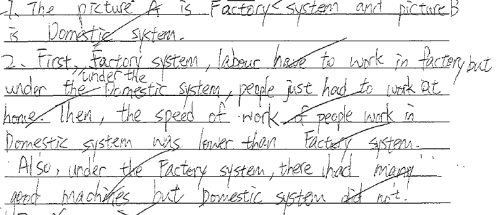Students’ learning
| 1. |
Students are able to transfer skills learned in English lessons to their learning of other subjects |
| a. |
Vocabulary learning skills |
In questionnaires, 77.4% of S2 students agreed that the materials used in English lessons were helpful for improving their performance in other subjects, and 76. 6% agreed that the vocabulary learning materials used in content subject lessons were helpful in learning those subjects. In examinations, S2 students were also able to use correct parts of speech, as indicated by the use of suffixes, when writing about methods of water purification. Teachers had worked on this with them in IS lessons, as shown in the worksheet and exam extract below:
In interviews, S3 students showed that they were able to apply what they had learned about affixation (referred to as “chunking” by teachers, since students learned about syllabification as well). Students said that the technique enabled them to remember words better and also to decode unfamiliar words when they encountered them in their subject-based reading.
 S3 Interview: Application of affixation in content subjects S3 Interview: Application of affixation in content subjects
| b. |
Understanding of text structures |
In questionnaires, 77.4% of S2 students agreed that the additional reading materials used in content subjects were useful for improving their performance in those subjects. Samples of students’ work also showed that they were able to apply some of the language structures related to the text structures when answering questions in the examination, as in the example from S1 Science given below.
Simple comparison |
 |
In interviews, S3 students mentioned the materials on cause and effect as being useful in strengthening their approach to reading and writing in History and other subjects.
 S3 Interview: Cause and effect S3 Interview: Cause and effect
| c. |
Reading comprehension skills and strategies |
Reading comprehension strategies were mainly taught explicitly in English lessons. Materials featuring reading strategies such as reading around the text, using prediction tables, making inferences and using graphic organisers to process information were designed and used by content subject teachers and found useful by students, but content subject teachers did not have sufficient time really to focus on the reading skills in their lessons. However, students did find the explicit teaching of reading strategies in English lessons beneficial. In interviews, one student mentioned her teacher’s use of the “think aloud” strategy as particularly useful in helping her to decode challenging texts.
 S2 Interview: think aloud for explicit teaching of reading strategies S2 Interview: think aloud for explicit teaching of reading strategies
| 2. |
Students felt more confident in taking exams in English and had better performance in questions requiring use of specific language structures |
In questionnaires, 62.7% of S2 students overall agreed that they felt more confident in taking exams in English as a result of the work done by English and subject teachers on language in the different subject areas. The figure was slightly higher for weaker than for stronger classes (64.7% and 61.9% respectively). In interviews, S3 students also mentioned that they had learned sentence structures which were useful to them in examinations in the content subjects.
 S3 Interview: preparation for exams S3 Interview: preparation for exams
In their performance in the examinations, students showed some improvement in using those language structures and vocabulary items which had been taught in English and subject lessons. Below are some examples from the second term History examinations:

S1 History: comparing modern and medieval town. The student uses “but” and comparatives to compare the two.

|
S2 History: comparing the factory and domestic systems |

S3 History: Writing about the advantages and disadvantages of communism. The student makes use of “however” and “but” to make comparisons and show contrast.
| 3. |
Students would benefit from more opportunities to apply the language learned in content subject lessons. |
Lesson observation of content subjects showed that, although teachers were working hard to help students understand new concepts and vocabulary items, the focus was mainly on teacher delivery rather than on student practice, and students did not have many opportunities to apply the language they had learned, particularly in speaking. This could be because of the limited number of lessons available for content subjects and the pressure teachers are under to cover the syllabus in the time they are given. Teachers may therefore think that such activities would not be a very wise use of time. However, in interviews students said that they would welcome opportunities to apply their learning in both writing and speaking.
 S3 interview: more chances to use the language S3 interview: more chances to use the language
Teachers’ development
English teachers became more aware of the language demands of other subjects and how the English curriculum can be adapted to provide better support for students. Subject teachers also learned how to predict students’ language difficulties in their own subjects and how to use some techniques from language teaching in their teaching materials. Teachers in the LAC group had opportunities to share their work with colleagues in staff meetings and professional development events.
|

